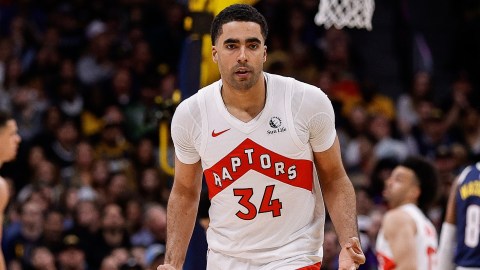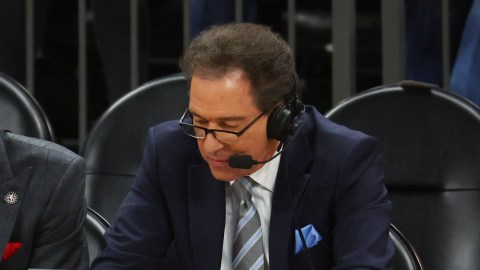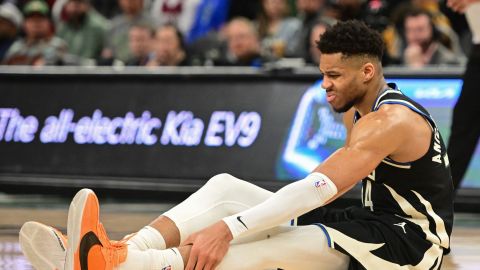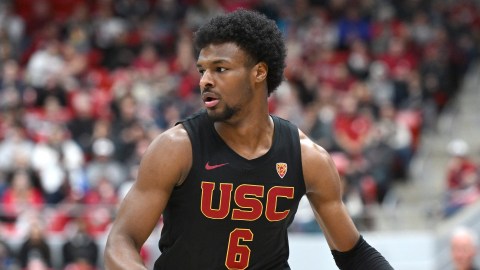There are enough professional athletes popping up on police blotters these days that Michael Beasley reportedly entering rehab might not have caught your eye.
The No. 2 overall pick by the Miami Heat was fined $50,000 before ever even stepping on an NBA court last September when security officers at the league’s rookie symposium smelled marijuana in a hotel room occupied by Beasley, Mario Chalmers, Darrell Arthur and two women.
Then on Friday, a photo surfaced on Beasley’s Twitter account showing off his brand-new back tattoo. In the background of the photo, though, was a small plastic bag. What the bag contained is unclear, though many assume it to be marijuana.
The Tweet-osphere was up in arms. And Beasley wasn’t pleased with the reaction. In subsequent Twitter posts, he wrote [sic]:
"Feelin like it's not worth livin!!!!!!! I'm done"
"I feel like the whole world is against me I can't win for losin"
Sounds pretty morbid compared to your typical Tweets from Shaquille O’Neal, Terrell Owens or Dwight Howard.
Monday came news that the 20-year-old Beasley checked into a Houston rehabilitation facility for treatment. One source told The Associated Press that the treatment “revolved around some stress-related issues,” widely assumed to be depression. Neither of the AP’s sources would comment on whether or not Beasley was receiving drug or alcohol counseling.
Drug and alcohol issues are one thing. They’re not easy to deal with, but they’re treatable. The NBA program — which some assume Beasley is already a part of — is designed to help players struggling with problems of that nature.
Immaturity is another issue with which Beasley has dealt. Scouts became concerned about his makeup as the draft approached and during the season, some of his Heat teammates, in fact, were unhappy with Beasley’s attitude. But the rookie power forward typically laughed it off. ESPN.com’s J.A. Adande suggests that Beasley’s path — one year of college to the pros — is largely to blame for his poor decision-making.
Depression, though, is a different matter altogether (though it could certainly explain both drug use and immaturity).
Depression is often overlooked as a serious issue for pro athletes. Think about it: For people who are so dependent on their physical prowess for success, it only makes sense that less emphasis is given to the emotional, psychological side of things.
Furthermore, when 20-year-olds of already questionable composition are thrust into real-world situations that have them traveling all over the country with millions of dollars in their pockets, it’s not hard to imagine some of them suffering from overstimulation.
Only recently has an athlete’s psychological makeup become recognized as part of his or her success. Tiger Woods comes to mind. There’s no one with a better understanding of what he has to do to succeed and how to keep things in perspective. Because of that, there’s no one sharper with a tournament on the line.
But there are plenty of cautionary tales on the opposite side of the spectrum.
Mike Tyson has battled depression for years and blames it for many of his problems.
Oakland A’s pitcher Justin Duchscherer announced recently that he will miss the rest of the 2009 season to deal with a "very treatable form" of clinical depression.
Women’s hoops star Chamique Holdsclaw took off in the middle of the Washington Mystics’ 2004 WNBA playoff chase to deal with her issues, then labeled "undisclosed medical reasons." She was traded to Los Angeles prior to the next season, but left the team five games into the 2007 campaign with similar problems.
"It can keep you from getting up in the morning, from eating, from being interested in anything," said Robert Butterworth, a Los Angeles based clinical psychologist. "It can affect the body as well as the mind. The symptoms of depression cause more depression, especially for an athlete who says, 'I'm the top person, and I'm not fulfilling my goal.' This adds to the straws that break the camel's back. An athlete would likely need two coaches, one to help you on the court and one to help you get out of bed and put one foot in front of the other."
When you’re supposed to be strong of body, admitting to having psychological issues is seen by many athletes to be a sign of weakness. It’s not an easy thing to deal with, much less admit it in the first place.
But as with overcoming other problems, admitting you’re depressed is the first step in dealing with it.
And Holdsclaw is coping with it, having returned to the WNBA, where she is averaging 13.9 points and 4.4 rebounds a game for the Atlanta Dream, who currently stand second in the Eastern Conference.
No one seems to know yet what exactly Michael Beasley is dealing with in that Houston clinic. And as much as his seeking help might serve as an “I told you so!” moment for his critics, let’s give him time to deal with his issues.
There are far worse ways that his depression could have played out.



